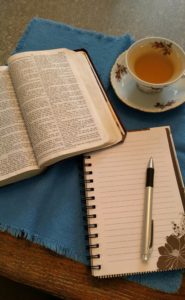The Gospel According to John

Week 1
Before you begin each day, pray for the Holy Spirit to help you understand what you are reading.
Start the study by reading through the entire book of John. There are 21 chapters in this book, making it easy to break down into manageable daily assignments. Next week we will begin examining each chapter verse by verse.
Day 1 – Read John 1-3
Day 2 – Read John 4-6
Day 3 – Read John 7-9
Day 4 – Read John 10-12
Day 5 – Read John 13-15
Day 6 – Read John 16-18
Day 7 – Read John 19-21
(Scroll down for Week 2)
Click the Green Button above for printable worksheets to use with this study.
(A zipped folder containing PDF files will appear in the lower left of the screen.
If you experience difficulties opening the files, Email me [Contact].)

Week 2
Pray before you start each lesson. Take time to learn the memory verses.
MEMORY VERSES: John 1:1, 2
DAY 1
It is essential to understand the author and his purpose for writing. Look up the following scriptures and make note of what you learn about the author: Matthew 4:18-22; Mark 3:17; Galatians 2:9; John 13:21-30; 19:25-27; 20:1-10; 21:1-8; Matthew 17:1-2
Use Blue Letter Bible to look up the difference between a disciple and an apostle and write it down. (Quick links have been provided this time to help familiarize you with BLB.)
Disciple [Definition]
Apostle [Definition]
NOTE: Don’t get discouraged if you don’t understand everything. Pray about it and the Holy Spirit will reveal things to you at the proper time. It is God’s will for you to understand His word. Ask Him to help.
DAY 2
Read John 1:1-18… Now go back and pray through the entire passage as the Spirit leads you, praying adoration (recognizing and praising God for who He is), confession, thanksgiving, and supplication (prayer requests).
Read John 1:1-18 again…this time paying specific attention to and/or marking every reference to God and Jesus (if marking, be sure to include pronouns). Record what you learn about Jesus on the Names and Titles of Jesus Worksheet that you printed from the link at the top of this lesson.
Take time to reflect on what you learned about Jesus today and don’t forget to praise Him!
DAY 3
Read John 1:1-5...Do word studies [Instructions] on the following words and record their information and your insights in your notebook: Word, Light, life, darkness. To further your understanding of these verses, look up the following references and record your insights: Revelation 19:13; Proverbs 8:22-36; Colossians 1:13-23
Read Acts 26:12-18; 2 Corinthians 4:6; 6:14; Ephesians 5:1-21 to get a better idea of the contrast between light and darkness. In verse 5, what is meant by “and the darkness did not comprehend it.”? Look at different Bible translations to see the word they use for comprehend. What does it really mean here? If you aren't sure, do a word study.
The first thing John wants us to understand is that Jesus was God.
First, he was the Word of God: “In the beginning was the Word”. The “Word” here is the Greek word, logos,
which means the same as our word, W-O-R-D. What is a word anyway? A word is an audible or a visual expression of a thought.
Thoughts are incommunicable until they are put into words…When Jesus was among us as a man,
he expressed what was going on in the mind of God. He told us the thoughts of God.
He was God’s utterance on earth, unveiling to us what Paul calls
“that secret and hidden wisdom of God,” (1Corinthians 2:7). - Ray Steadman
DAY 4
Read John 1:6-12… (Did you remember to pray?) Who is the “John” in this passage? Read Luke 1:5-17 and record what you learn about him, leaving room to add further information you will obtain in future lessons. How was he “sent by God”? What was God’s purpose for him?
“Nothing more fully shows the darkness of men’s minds, than that when the Light had appeared,
there needed a witness to call attention to it.” - Matthew Henry
Read John 1:9… John’s mission was to testify about the Light, but who was the “true Light” and what did the “true Light” have the power to do? Read Isaiah 42:5-9; 49:5,6; 1 John 5:20
Read John 1:10-11…Why didn’t the world “know” Him? Who was considered to be “His own” and why didn’t they receive Him? To answer these questions, first, do a word study on received. Now read the following passages and record what you learn: Genesis 17:5-7; Acts 3:22-26; 13:22-28; Isaiah 53:2-4; Acts 7:49-52; Luke 20:9-19
Read John 1:12-13… Look up the word received in verse 12 and note any differences in meaning as compared to verse 11. (Hint: one means to acknowledge as; the other to accept; give access to oneself, to believe on Him) Do a word study on believe. Read Galatians 3:22-29; 1 Peter 1:17 thru 2:17 (“word” in verse 1:23 is Logos)
"Many say that they are Christ’s own, yet do not receive Him, because they will not part with their sins,
nor have Him to reign over them. All the children of God are born again."
- Matthew Henry
DAY 5
Read John 1:14-18…Do word studies for the following words: glory, fullness, grace, truth
Read John 1:14, 15…(only begotten = unique, one of a kind) Look up the following scriptures and record your insights: Isaiah 7:14; Matthew 1:23; Luke 1:26-35; Phil 2:5-11
Read John 1:16-18…Based on what you learned from your word studies, as well as the proceeding scriptures, what all can be received because the Word became flesh? Who are the recipients? Spend some time thinking about what these truths mean to you and write it down. Fill in the Chapter Theme for the first part of the chapter as well as the Author, Purpose, and Key Words on the Outline Worksheet.
LIFE APPLICATION: Read 2 Peter 1:2-11.
(Scroll down for Week 3)

Week 3
Pray.
MEMORY VERSES: John 1:3-5
DAY 1
Read: John 1:19 – 2:25
Now read it again, this time praying through the scriptures as you did on Day 2 of Week 2.
Read it once more, paying close attention and/or marking every reference to Jesus and recording what you learn about him on your Names, Titles, and Characters of Jesus Christ Worksheet.
DAY 2
Read: John 1:19-34
Refer to the notes you took last week as well as the cross-references listed to answer the following questions about John the Baptist: What was his role? Luke 1:17; Isa 40:1-5. How did he fulfill his role? Mark 1:2-8; Luke 3:15-16; Acts 19:1-5
Baptism: How does John's Baptism differ from a Christian baptism? Record what you learned about the contrast between water baptism and baptism of the Holy Spirit. Ephesians 1:3-14; John 14:15-17, 26; Romans 5:20 thru 6:11; Romans 7:4-6
Why did the religious leaders question John’s identity and actions? Why would they mistake him for Elijah (Elias), the Prophet, and even Christ?
The religious leaders…the Pharisees, in particular, thought themselves specially called to act as guardians of the ceremonies of religion. Read: Mark 7:1-13
(The accounts of Elijah can be found in 1 Kings 17 - 2 Kings 2…a good read if you have time.) Read 2 Kings 1:8; Malachi 4:4-6, Matthew 3:4; 11:14; 17:9-13
Who was “the Prophet” they were referring to in verse 21? Read: Deuteronomy 18:15, 18; Acts 3:22, 23; Acts 7:37
John was going against customary practices and baptizing Jews (not just Gentiles), therefore, his authority to do so was being questioned.
“As he had just before applied to himself a prediction (verse 23)
that they all considered as belonging to the forerunner of Christ, the Pharisees might have understood why he did it;
but they were blind, and manifested, as all sinners do, a remarkable slowness
in understanding the plainest truths in religion.” - Barnes
LIFE APPLICATION: Thinking back on the last year (or even last week), what are you doing to prepare the way for Jesus in your own life? In the lives of others?
DAY 3
Read: John 1:35-42
Why did John the Baptist refer to Jesus as the “Lamb” of God? Read Isaiah 53:5-7
The "Law" was used to identify/define sin and God required a sacrificial system to atone for it. We see this beginning in Exodus 19 and throughout Leviticus. Reading through those passages will help you gain a greater appreciation for Jesus, the "Lamb" of God...specifically the sacrifice details in Leviticus 4, 5, & 16.
In verse 38, Jesus turns to the disciples that are following Him and asks, "What do you seek?"
LIFE APPLICATION: Answer the question, "What do you seek?" Do you seek wealth, comfort, friends, popularity, or other things above Jesus? The answer lies in the health of the relationship you have with Jesus...through your prayer life...and the time you spend in His word.
In verse 41, the FIRST thing Andrew did after John identifies Jesus was to find his brother Simon and tell him, “We have found the Messiah,” and then brought him to Jesus. Before that, John the Baptist’s disciples heard and turned to follow him. Take some time to think about how they must have felt…the excitement, etc. What was it like when you first came to or first heard about Christ? Or when you started recognizing His presence in your life? What is your response when you receive enlightenment to His truths? Are you so excited that you have to run and tell someone? Do you immediately turn from your ways to follow His?
Spend time with Him in prayer…praising Him for the grace that He has extended to you…for revealing Himself to you, etc.
DAY 4
Read: John 1:35-51
Record each disciple and what you learn about them; personalities, character, their responses to Jesus. If you have time, do topical studies on each to gain even more background info on them. (Using www.blueletterbible.org, type their name in the "Search" box, select NASB as your Bible version, click the green search button. Read the scriptures in which they are mentioned, as well as any surrounding scriptures that provide insight.
Why did Nathanael respond the way he did in verse 46? Look up info on Nazareth and record what you learn about the place Jesus grew up. (Blue Letter Bible has many study tools. Use the same method above, only click the "Tools" button before the verse to get to the "Dictionaries" tab...or click here.)
Read John 2:1-11
Turning water into wine was the first sign (miracle) Jesus performed in Galilee. The “signs” were meant to reveal His glory. In what way do we see it here? Record your insights on The Signs in John’s Gospel Worksheet that you printed in Week 2.
Why do you think Jesus responded to His mother the way He did in verse 4?
LIFE APPLICATION: Do you ever get “ahead of” Jesus? In what way? What is the result?
Read: Ecclesiastes 3:1-14; Psalm 130; Psalm 147:11; Isaiah 40:31
LIFE APPLICATION: Belief was the disciples’ response to this miracle. Have you ever witnessed a miracle? What was your response? Did you record it? If not, grab a journal and do so. It will serve as a reminder, both to you and those after you.
DAY 5
Read John 2:12-25
Do a word study on Zeal. [click here]
What scripture is remembered by the disciples and referred to in verse 17? Find cross-references for this verse. [click here]
What did remembering these words cause the disciples to do?
How did the Jews respond to what Jesus did (vs.19)? Why did they misunderstand His response to their question? What prophesy do you see in this passage? What did his disciples do when this prophecy was fulfilled?
LIFE APPLICATION: Do we have a zeal for God’s house? In what ways do you see places of worship defiled today? Jesus refers to His body as a temple. Read 1Corinthians 6:12-20 and Romans 12:1-2, record any insights you have as to how we are to view/treat our bodies.
Note: The cleansing of the temple in this passage is the first cleansing of the temple, not to be confused with the one near the end of his ministry as written in Matthew, Mark, and Luke.
Read John 2:23-25 again.
It says that “many believed in His name”. What does it mean to “believe in His name”?
HINT: According to Thayer’s Greek Lexicon, in this “degree” of faith/belief, Jesus isn’t yet recognized as the Messiah, but as a prophet very much like the Messiah.
Do a word study on Entrusting (vs. 24). Why didn’t Jesus entrust himself to man?
LIFE APPLICATION: Do you entrust yourself to man or to Jesus?
Don’t forget to add pertinent info to the Outline Worksheet for the 2nd half of Chapter 1 and for Chapter 2. (chapter theme, keywords, etc.)
I hope you are taking it slow and making lots of notes. As you probably know, we retain more of what we study if we see it, hear it, and write it down. Have you been working on your memory verses? When you read a passage and/or study a memory verse, try reading it aloud, as well as to yourself.
(Scroll down for Week 4)

Week 4
Pray.
MEMORY VERSES: John 1:6-8
DAY 1
Read John 3 and 4.
Read it again, this time praying through it.
Go over these chapters again, paying close attention to or marking all references to Jesus (including pronouns). Record info on you Names, Titles, and Characters of Jesus Christ Worksheet.
Note any keyword on your Outline Worksheet. (Printed from the link in Week 2)
DAY 2
Read John 3:1-21.
Now, read it looking for and/or marking all references to Nicodemus (including pronouns).
Let’s take a closer look at the magnitude of what Jesus is saying in verse 3. Read Ephesians 1:3-9;2:2; Titus 3:4-7. Record your insights before going any further.
It is not enough to just be a Jew. It isn’t enough to just acknowledge that Jesus was sent from God and is the Messiah. One must experience that great change within his own soul, the regeneration that comes by the Spirit…a born again (“again,” meaning from above), new life.
This “heart change” was not a new doctrine or concept to the Jews. Read Ezekiel 11:19, 36:25-27
Verse 5 tells us that one must be “born of water and the Spirit”. Read Romans 6:3-14; Acts 2:38; Romans 8:12-17; 1 Corinthians 2:12-16
Look at verse 6 and the contrast between “birth by the flesh” vs. “birth by the Spirit”. Make two columns on your notepaper and record what you learn in the following scriptures: Gen 5:3, 6:5,12; Romans 7:5-6; Romans 8:5, 9, 13; 1 Corinthians 15:47-58; Galatians 5:16-26; 1 John 3:9,10
Do a word study on Kingdom (vs 3 or 5). Verse 3 says “no one can see the kingdom of God unless…”; Verse 5 “no one can enter the kingdom of God unless…” Considering what you learned about the word kingdom, what all would one be missing out on if not born again? Romans 14:17-19
LIFE APPLICATION: How are you “pursuing the things which make for peace and the building up of one another?”
What is Jesus saying in verse 8? Take some time to pray and ponder this verse and record your insights.
DAY 3
Read John 3:8-21
Like the wind, the Holy Spirit cannot be controlled or understood. Its timing is unpredictable. One can not determine the workings of the Holy Spirit or when It will bring new birth.
In verses 9-11, Nicodemus, a Pharisee, is challenged by Jesus as one who teaches Israel, yet doesn’t understand what he is teaching. Read Matthew 23.
LIFE APPLICATION: Have you ever witnessed any of this in church leadership? If so, please take time to pray for that church leadership. Could any of the things mentioned describe you? If so, take time now to write a prayer asking the Lord to correct your thoughts, attitudes, and actions.
When you read verses 12-15, keep in mind what Jesus just said in verse 11 and record your insights.
Read Numbers 21:6-9. What do you learn from this comparison Jesus made in verses 14 & 15?
OK, here it is, John 3:16. It is a familiar verse to believers and non-believers alike. But what does it really mean to believe… "to believe in God’s only begotten Son?" Take your time…pray…do not miss anything He has for you in verses 16-21. (Refer back to the word study you did on Believe on Day 4 of Week 2.)
LIFE APPLICATION: Are you “believing” in every area of your life?
DAY 4
Read John 3:22-36
Why were John’s disciples concerned with the growing popularity of Jesus?
As John gives his last testimony, we find clues to how he perceived his calling. What does this tell us about his character?
The following scriptures support John’s testimony: Psalm 72:17-19; Isaiah 9:7; James 1:17; 1 Corinthians 2:12-16; Romans 1:18-32; 1 John 5:10-13
LIFE APPLICATION: Do you take joy in the things He calls you to do? Do you do them without complaining or expecting praise? Are you obedient to His call regardless of your abilities?
Read John 4:1-26
Use your Bible dictionaries to find out why the Jews “have no dealings with Samaritans” as stated in verse 9.
How did she know Jesus was a Jew? What does Jesus teach us in this passage about prejudices?
How would you explain verses 13 & 14 to someone?
What does it mean to “worship in spirit and truth”? Do word studies for Spirit and Truth (vs.24).
DAY 5
Read John 4:27-45
What harvest is Jesus speaking of in this passage?
LIFE APPLICATION: How available and eager are we to look for and seize opportunities for evangelism?
Ponder this...
"Our text challenges me to question just how committed I am to obeying our Lord.
The “work” to which our Lord was committed was the “Father’s work,” the work of salvation.
He was so committed to completing His work that He refused to eat a meal when it interfered with this work.
Am I as committed to the salvation of men as God is? Am I willing to forego a meal, a restful evening, a bigger house,
a more affluent lifestyle, so that God’s work might be advanced?
This text exposes my own self-centeredness,
my own reluctance to subordinate my self- interests to God’s interests." - Bob Deffinbaugh
Look closely at verses 40-42. What made the difference in the Samaritans’ belief of who Jesus was?
Read John 4:43-54
Record what you learn about this miracle on your The Signs in John’s Gospel Worksheet.
Don’t forget to add pertinent info to the Outline Worksheet for Chapters 3 & 4.
Now, glance back through the scriptures you studied this week and your notes. Select a portion of scripture that really encouraged your soul as the Spirit gave you understanding and pray through it again, aloud, as if our Lord were seated next to you. Don’t skip over this…you’ll miss a blessing.
NOTE: One could never exhaust the book of John or any other book of the Bible for that matter. Please don’t limit yourself to just completing this homework…follow the Holy Spirit’s leading.
(Scroll down for Week 5)

Week 5
Pray.
MEMORY VERSES: John 1:9-11
DAY 1
Read John 5 and 6.
Read it again, this time praying through it.
Go over these chapters again, paying close attention to or marking all references to Jesus (including pronouns). Record info on you Names, Titles, and Characters of Jesus Christ Worksheet.
DAY 2
Read John 5:1-18
Record what you learn about the sign/miracle recorded in the first 9 verses on your Signs Chart.
Do a word study on Persecuting (vs 16)
Why were the Jews persecuting Jesus? Read Exodus 31:15; 35:1-3
LIFE APPLICATION: How are we to honor the Sabbath? Read Hebrews 3 & 4.
Read John 5:19-24
Study the following supporting scriptures and record any new insights in your notes: Matthew 17:5-8; Matthew 11:27; Deuteronomy 32:39; Romans 4:16-25; Luke 7:11-15; Luke 8:49-56; Matthew 16:24-27; Matthew 25:31-46; Matthew 28:18; Acts 10:34-42; 2 Corinthians 5:10; 1 John 2:18-25 Do a word study on Honor (vs 23). Read Romans 10:11-13; Romans 8:1-4; 1 Thessalonians 5:9-10
LIFE APPLICATION: If Jesus were to judge you today, what would be the verdict?
DAY 3
Read John 5:25-30
Who are the “dead” referred to in verse 25? [Click Here] (Hint: II. Metaphor)
Read: Romans 6:12-14; Ephesians 5:1-14; Revelation 3:1-5
Explain the description of Jesus as the “Son of Man.” (vs. 27) [Click Here] Be sure to look up the scriptures listed in this description.
What “hour” is Jesus referring to in Verses 28-29? Read 1 Corinthians 15:35-58; 1 Thessalonians 4:13-18; Rev 20:11-15
Read John 5:31-47
Do a word study on Testify (vs. 31). Record what you learn about the different “testimonies” and from whom/what do they come?
What do you learn about the Jews in this passage?
Record any insights you had about believing.
DAY 4
Read John 6:1-14
Record all you learn through this sign. Take your time…do not miss anything just because this story is familiar. How did the people respond? Read Deuteronomy 18:15-18 regarding the “prophet” the people were referring to in Verse 14.
Read John 6:15-21
What did Jesus teach His disciples in this sign? Don’t forget to record this and other signs on your Signs Chart.
Read John 6:22-40
Explain verse 27 by finding cross-references and doing word studies.
What did you learn about bread? Record the “I AM” Statement from this passage in your notes.
What does Jesus tell the people about God’s will? Make a separate list in your notebook to record all that you learn about God’s will as we continue to study John.
DAY 5
Read John 6:41-55
Cross Reference verses 44 & 45 with John 6:37, 39, 65; Matthew 13:11; John 3:27; John 17:1-3, 24; John 12: 27-32 and record your insights. Do a word study on Draws (vs. 44).
Record what you learn about the contrast between manna and the Bread of Life.
Cross-reference verses 53 & 54 with Matthew 26:26-28. What does it mean to eat the flesh and drink the blood of Jesus? Is it just a matter of taking communion? (see verse 56) What must one do?
Read John 6:59-71
Is it possible for a disciple (follower) to turn away from Jesus? Why?
What was Simon Peter’s response when Jesus asked the twelve if they wanted to leave also?
LIFE APPLICATION: Do a personal inventory of the evidence of belief in your life. Would you have the same response as Simon Peter?
Don’t forget to add pertinent info to the Outline Worksheet for Chapters 5 and 6.
(Scroll down for Week 6)

Week 6
Pray
MEMORY VERSES: John 1:12-13
DAYS 1 and 2
Read John 7.
Read it again, this time praying through it.
Go over this chapter again slowly. Observe the way Jesus communicates with the people. What effects did His teachings & responses have on the people? If it helps to mark all references to Jesus and God, do so, then record what you learn about Him on your Names, Titles, and Characters of Jesus Christ worksheet.
Don’t rush through this…there is a lot of information here. Several groups are addressed and each has a different response to what Jesus says. A chart is included with this lesson to help you keep it all straight. Various Groups Opinions Worksheet (Print from “Worksheets” button on Week 2).
List 3 things you learn from this chapter that believers can experience with Christ.
Read the following scriptures to gain background on the Festival of Booths to see the significance of what Jesus says on the last day. Deuteronomy 16:12-15; Leviticus 23:33-44; Nehemiah 8:13-18; Numbers 29:35
DAYS 3 and 4
Read John 8.
Read it again, this time praying through it.
Go over this chapter again slowly. Observe the way Jesus communicates with the people. What effects did His teachings & responses have on the people? If it helps to mark all references to Jesus and God, do so, then record what you learn about Him on your Names, Titles, and Characters of Jesus Christ worksheet. Record info on the Various Groups Opinions Worksheet, also.
What was the price for adultery according to the law? Read Leviticus 20:10; Deuteronomy 22:22. What did you learn about Jesus from the way he handled the situation with the adulteress?
LIFE APPLICATION: How often do you need to be reminded of this lesson? Take a few minutes to examine your thoughts and actions toward others when it comes to their sin. Are you throwing stones or lifting them up in prayer?
Record what you learn about the “I AM” statements made in this chapter.
What must one do as a disciple of Christ according to verse 31? What does it mean to “continue in My (His) word and of what benefit is it to do so?” What does being “free indeed” mean (v36)?
List at least 3 more things you learn in this chapter that believers can experience with Christ.
DAY 5
Pray
Read John 7 & 8
JOURNAL: Write a prayer of thankfulness based on what you learned in these chapters. (i.e. Thanking God for granting you to Jesus, for the Light in your life, for freedom from sin, etc.)
JOURNAL/LIFE APPLICATION: Record any epiphanies you have had thus far in the study and how you will apply them to your walk.
Don’t forget to add pertinent info to the Outline Worksheet for Chapters 7 and 8.
(Scroll down for Week 7)

Week 7
Pray
MEMORY VERSES: John 1:14-15
DAY 1
Read John 9
Read through it again marking and/or recording all references to Jesus & the Father and what you learn. Take time to pray through at least one section or group of scriptures in this chapter.
DAY 2
Read John 9:1-12
What did the disciples assume to be the cause of the man’s blindness?
LIFE APPLICATION: Do you ever think this way? Do you look at someone who is suffering and try to figure out what sin caused it? Why? Is this right thinking? What should we be thinking/doing instead?
Why did Jesus say that their work needed to be done during the day? Do a word study on Night (vs. 4).
In verse 5, Jesus says, “I am the light of the world.” Refer to the word study you did on Light (in Week 2, Day 3) and record this statement and what it means on the “I AM” statement lists you are keeping.
How did Jesus heal the blind man? What was the significance of using this method as opposed to speaking him healed? Record what you learned by this sign.
Read John 9:13-34
The Pharisees then questioned the formerly blind man and even his parents. Note his testimony and the testimony of his parents. How did they differ? To whom were the Pharisees asking the man to credit this healing?
LIFE APPLICATION: Do you ever cower from speaking truths about Jesus for fear of being excluded from a group or fear of losing relationships?
Do a word study on Reviled (vs 28). What happened to the blind man because of his testimony?
DAY 3
Read John 9:35-41
Describe what took place in the conversation that Jesus had with the formerly blind man after he had been cast out of the synagogue.
Do a word study on See and Blind (vs 39). Now cross-reference verses 39-41 with Matthew 13:10-17; Matthew 15:1-14; and John 12:27-43 and record your insights.
Read Psalm 118:19-21
Read John 10, praying through at least part of it.
Go back through these scriptures paying close attention to what it says about Jesus and God, and then record your insights.
DAY 4
Read John 10:1-21
Do a word study on Door (vs. 1).
Why did Jesus use a parable on Shepherding when speaking to the Jews?
Clue: Read the prophecy in Jeremiah 23:1-6; Ezekiel 34.
Record all that you learn about Shepherding as well as the “I AM” statements in this passage. What makes Jesus the Good Shepherd?
Who are the thieves, robbers, hired hands, and wolves? Describe them.
In Acts 20:28-38, Paul warns the elders of the church of Ephesus as he bids them farewell and gives an account of his dealings with them. What do you learn about shepherding from his example?
LIFE APPLICATION: Is shepherding important today? Who could be called shepherds? What characteristics and/or actions should they possess/practice?
Who is Jesus referring to as the “fold” in verse 16? Who are the “other sheep” that are not of that fold? Look at Isa 56:8; Acts 15:7-9.
Carefully study verses 17 and 18 and record your insights.
Once again, the Jews were divided in their response to what Jesus was saying. Record their responses.
DAY 5
Read John 10:22-42
Research the Feast of Dedication and record the details.
What did the Jews want from Jesus? How does he respond?
LIFE APPLICATION: Jesus says that His works testify as to His identity. Do your works testify of your identity in Christ?
What is true of Jesus’ sheep?
Cross-reference verse 30 with John 17:11, 21 record these scripture references and your insights.
Do a word study on Blasphemy (vs 33)
Jesus refers to Psalm 82:6 in verse 34. Read it, do a word study on gods (vs 34) and on word (vs 35) and record your insights for verses 33-39.
Where did Jesus go when He escaped from being stoned by the Jews? What happened when he got there?
LIFE APPLICATION: Take a look at 2 Tim 3:16, 17 below:
16 “ All Scripture is inspired by God and profitable for teaching,
for reproof, for correction, for training in righteousness;
17 so that the man of God may be adequate, equipped for every good work.
On a separate page in your notebook, make note of how God is using this study to “train you in righteousness.”
Don’t forget to add pertinent info to the “Outline Worksheet” for Chapters 9 and 10.
Did you work on your memory verses? Make sure to cover all of them (John 1:1-15)
20 Now the God of peace, who brought up from the dead the great Shepherd of the sheep
through the blood of the eternal covenant, even Jesus our Lord,
21 equip you in every good thing to do His will,
working in us that which is pleasing in His sight,
through Jesus Christ, to whom be the glory forever and ever. Amen.
- Hebrews 13:20-21 NASB
(Scroll down for Week 8)

Week 8
PRAY
MEMORY VERSES: John 1:16-18
DAY 1
NOTE: There are many instances where it will be helpful and/or necessary for you to read the King James Version of the Bible (or others) in order to properly interpret the scriptures in this lesson.
Read John 11
Record what you learn about Jesus from this miracle on your “Signs…” worksheet.
How did Jesus know Lazarus, Mary, and Martha? Luke 10:38-42
Why didn’t Jesus go to Lazarus as soon as He got word that he was ill?
When speaking of the man blind from birth (John 9), Jesus explained that his blindness was not a result of any sin, but that God be made manifest (be glorified) in him. God was also to be glorified by the death of Lazarus. What do we learn from these accounts?
LIFE APPLICATION: Have you experienced a trial or suffering in which you are now able to identify how God was glorified by it?
Why were the disciples concerned about Jesus going to see Lazarus? Explain the response Jesus gave in verses 9 and 10 regarding this concern. Doing a word study on stumble (vs. 9) might help.
Read verse 15 in the King James Version of the Bible.
Why was Jesus glad that He and His disciples weren’t there when Lazarus was dying?
What do you learn about Thomas (Didymus) in verse 16?
DAY 2
Read John 11:17-46
What do Martha’s statements to Jesus in verses 21 and 22 tell us about her faith?
What does Jesus tell her by his response and “I AM statement”? Record info on your “Names, Titles,…” worksheet and/or “Belief list” that you have been making.
How did Martha answer the question Jesus asked of her, “Do you believe?”?
Why did Martha secretly tell Mary about the arrival of Jesus? Where did the Jews think Mary was going and what did they do?
Do a word studies on moved in the spirit, and troubled (vs. 33). Explain the reaction that Jesus had in verse 33 based on what you learn from these word studies. (To fully understand the meanings of these words as they are used in this scripture, you must use the Thayer’s Lexicon below the Outline of Biblical Usage section. Look for the scripture reference following the definitions to find which one is applicable. Some words have a long list to sift through. Below this list is an index of scripture references. Click on it to quickly find the correct definition.)
In verse 35 it says, “Jesus wept”. Do a word study on wept. Is it the same word as they used for weeping? What is the difference? What does His reaction to this situation tell us about Him? Did the Jews perceive his tears correctly?
When Jesus told them to remove the stone from the grave, what was Martha’s concern? How did Jesus respond? Record this info on your “Belief list”. What did Jesus do when they removed the stone? Why?
How did the Jews respond to this miracle? Was their belief a “saving faith” or “intellectual faith”. Refer back to the word study you did on "belief" or check it in Thayer’s Lexicon. Record this on the “Various Groups’ Responses Worksheet” (Worksheets link is in WEEK 2)
How was God glorified by the death of Mary and Martha’s brother?
DAY 3
Read John 11:46-57
Do word studies on place and nation (vs.48). What fear did the council have concerning Jesus?
Read Matt 26:57-68 and John 18:12-24 to learn more about Caiaphas.
Carefully study verses 49-53...pray for discernment. Look at different translations. What was Caiaphas trying to communicate in verses 49 & 50? Was his prophesy from God? What did Caiaphas hope to accomplish? What did his plan actually do?
How did God use this?
Spend some time reviewing the events of Passover and the Passover Feast. (Exodus 12)
DAY 4
Read John 12
Supper had been prepared for Jesus at the home of Mary, Martha, and Lazarus. What was each of them doing according to the first few scriptures?
Read Matt 26:6-13; Mark 14:3-9 and note any differences. Read verse 4 in other translations of the Bible.
How did Judas react to what Mary did to Jesus? Why? Was he concerned about the poor? How did Jesus respond to his remark? Read verse 7 in King James.
In verse 9, why did the crowd come? What were the Pharisees planning to do to Lazarus? Why?
Read Matt 21:1-11, 14-17; Mark 11:1-11; Luke 19:29-44
What did the crowd at the feast do when they saw Jesus was coming to Jerusalem?
Did the disciples understand all that was happening at that time? When did they? Do a word study on glorified (vs. 16) if you haven’t already.
Who began testifying about Jesus? What happened as a result?
In verse 20, we are told some Greeks came to the festival to worship. When they asked to see Jesus, what was his response?
Do the following word studies for verse 24…truly, die, remains, alone, fruit. Now, based on the definitions of these words, rewrite this verse in your own words. See Matt 10:39.
Explain the contrast seen in verse 25.
Do the word studies for verse 26 in order to rewrite it the way you would explain it to a friend. See Luke 14:26, 27, 33.
DAY 5
Read John 12:27-50
What happened when Jesus said, “Father glorify Your name”? Who does Jesus say the message was for?
In verse 31, Jesus says, “Now judgment is upon the world”. In other words, the time has come to determine who will rule it. What “ruler” is He referring to?
By saying “I am lifted up” in verse 32, the Jews knew the kind of death Jesus meant. This confused them. Look at Dan 2:44, 7:14; Mic 4:7. Why are they struggling to make the connection between the Son of Man and Christ? What were they thinking?
List the contrast between living in the light vs. darkness/belief vs. unbelief that you see in verses 35-50.
Read Isa 53:1-12, Isa 6:1-10; Matt 13:14-15 to cross-reference verses 37-41.
LIFE APPLICATION: Are you seeking the approval of men or God? Are you truly confessing to Him or merely stating that you believe?
Don’t forget to add pertinent info to the “Outline Worksheet” for Chapters 11 & 12
(Scroll down for Week 9)
 Week 9
Week 9
PRAY
MEMORY VERSES: John 14:15-17
Note: Be sure to fully utilize the time-saving features of blueletterbible.org. Instructional videos can be accessed from the homepage. In this lesson, you will benefit from the “MultipleVerse Retrieval” feature as well as “BLB Scripture Index of Thayer’s.” When doing word studies, the Thayer Lexicon is very helpful when determining the proper definition of the passage because they list the scripture references that correspond to each definition. The index helps you locate the scripture references faster.
DAY 1
Read John 13
Pray through sections of these scriptures as you mark every reference to Jesus, the Father, etc. Record what you learn.
Read John 13:1-2
How much did Jesus love His own?
Read: Matt 26:1-5, 14-20; Mark 14:1-2, 10-17; Luke 21:37; 22:2-16…note significant events and differences. Also, look closely at what is going on with Judas.
NOTE: Reading these accounts will help “set the scene” for what is coming next in John. It helps us know what has taken place; what the disciples have witnessed/experienced, etc. It will be necessary to do this a few times in this lesson.
DAY 2
Read John 13
How did the disciples respond to Jesus washing their feet? Why was it only necessary to wash their feet? What reason does Jesus give for washing each other’s feet? What do we learn from this act?
Read Phil 2: 1-8; Luke 22:27
Do a word study on blessed (vs. 17).
What happens when we function in Christ’s example? (vs 17)
Read 2 Tim 2:19 and Ps 41:9 as a cross-reference to verse 18.
Why does Jesus start telling the disciples what is going to happen before it happens?
For verse 20, read Luke 10:16, do a word study on receives (Jn 13:20), then re-write the verse in your own words.
Read: Matt 26:21-25; Mk 14:18-21; Luke 22:21-23; Jn 13:21-30 noting any significant details or differences.
What happened to Judas when he ate the bread? Do a word study on entered (vs 27). At this point did the disciples “pick up” on the fact that Judas was the betrayer? Where did they think he was going when he left? Why didn’t they think Judas was capable of being the betrayer? (Keep in mind that John wrote this well after the truth about Judas was discovered. Up until his betrayal, he was trusted with some important jobs.)
After Judas was gone, what did Jesus say was now going to happen? What new command did he give?
Read: 1 Thessalonians 4:7-9; 1 Peter 2:21-25; 1 Jn 2:9-10
What will happen as a result of loving one another as Christ loves us? (vs 35)
Read Acts 2:38-47 paying close attention to the attributes of those who believed and what happened as a result.
(vs. 37) What was Jesus’ response to Peter when he said he’d lay down his life for the sake of Jesus? Read Luke 22:31-38 as a cross-reference.
Are there any “I AM” statements in this chapter?
DAY 3
Read about the Lord’s Supper in the following scriptures: Matt 26:26-29; Mk 14:22-25; Lk 22:17-20; 1 Cor 11:23-26 making notes of significant events and differences.
Read John 14.
Mark all references to Jesus, God, and the Holy Spirit. Also mark the words: Believe, Love(s), and Give. Record your insights.
What is Jesus asking the disciples to do in verse 1?
Read 2 Cor 5:1 as a cross-reference for verse 2.
Since Jesus is going to prepare a place for them, what does He say He will do?
Read Acts 1:9-11. How will He “come again”?
Find cross-references to the “I AM” statement that Jesus makes in verse 6 and do a word study on “the way.” Record what you learn.
Did Philip understand what Jesus was saying at this point (vs 7)? What did he ask of Jesus? What did Philip mean by “enough” in verse 8? What do we learn from the response He gave Philip? (Look in verses 9-11)
Study verses 12-15 carefully. What are the keywords in these verses? (Hint: believes, ask in My Name, love, keep)
Think about and write an explanation of how these words affect the results of our supplications.
Read: James 1:5-8; 1 Jn 3:21-24; 1 Jn 5:14-15 as cross references for verse 14.
LIFE APPLICATION: Verse 15 tells us that our obedience displays our love for the Lord. Take some time now to pray, asking the Lord to reveal any area of your life, even your thought life, that is not obedient to His commandments. Ask for help in these areas.
DAYS 4 and 5
Read John 14:16-31
What promise is recorded in verses 16 & 17? To whom does it apply?
Read: 1 Jn 5:1-6; 1 Jn 4:6, Ro 8:5-8 as cross-references for verse 17. Record any insights.
(vs 18) What word does the King James Version use for orphans? What does it mean?
Do word studies for world and live (vs 19). What kind of life do we have because He lives?
Do a word study on disclose (vs 21). What is true of one who knows and keeps Christ’s commandments?
Read: Matt 10:3, Luke 6:16, Jude 1:1 and do a word study on Judas (vs 22).
John tells us that the Judas who questioned Jesus in verse 22 was not Judas Iscariot. Who was he? How did Jesus respond to his question?
Do a word study on words (vs 23). According to verse 23, the one who loves Christ will keep His words. What does He say will happen as a result?
Do a word study on Helper (vs 26). What did you learn about the Holy Spirit?
Do a word study on peace (vs 27). What gift does Jesus give them according to verse 27? How does the way He “gives” differ from the way the world “gives”?
What does Jesus mean by the statement he made in verse 28?
Read: 2 Cor 5:21; 1 Jn 3:5; Heb 4:15 as cross-references for verse 30. Along with verse 30, what do we learn about Jesus from these references?
LIFE APPLICATION: Does Satan have any part of you? Any power over you? Are you swayed by his temptations?
Read: John 14:31; Phil 2:8; Heb 5:7-9
What commandment is Jesus speaking of in verse 31? What reason does Jesus give for being obedient and keeping this commandment?
Add pertinent info to the “Outline Worksheet” for Chapters 13 & 14.
(Scroll down for Week 10)
Week 10
PRAY
MEMORY VERSE: John 14:18-19
Days 1 & 2
Read John 15
Pray verses 1-11. (If you haven’t already printed this chapter for marking purposes, please do so from Blue Letter Bible.) Mark the word Abide.
For each verse below, do word studies, read cross-references, record any pertinent information on your worksheets, and answer the questions:
| Vs. | Word Studies | Cross References | Questions |
| 1 | True, Vinedresser | Isa 5:1-7; Ps 80:7-19 | Who is Jesus speaking to? Where are they? |
| 2 | Prunes | Mk 4:18-19; Gal 5:22-26 | Who are the branches? |
| 3 | Clean | Eph 5:26 | How does one become clean? What does clean mean? |
| 4 | 1Jn 2:3-6 | Can one bear fruit on his own? What does it mean to abide in Him? | |
| 5 | Apart from Christ, of what are we capable? | ||
| 6 | Cast/thrown away dries | Ez 15:1-8; Mt 13:40-42 | |
| 7 | Mt 7:7
Mt 4:1-11 |
Many people read God’s word; is there a difference in knowing God’s word and abiding in it? In Mt 4, who knows God’s word? | |
| 8 | Prove (same word as “done” in verse 7) | What does a true disciple of Christ do? | |
| 9 | |||
| 10 | What happens when we keep Jesus’ commandments? | ||
| 11 | Full | 1 Pet 1:6-8; 2 Cor 7:4 | What does Jesus mean by “that your joy might be complete? |
Make a list of all that Jesus says (in verses 1-11) is necessary in order to bear fruit and what happens as a result of doing these things.
Day 3
Read John 15:12-25
Do a word study on life (vs. 13).
LIFE APPLICATION: How do we love one another? What does it mean to lay down one’s life for another? Take your time…pray about it…then answer.
What is the difference between a slave and a friend? Is Jesus a friend to all? Is He your friend? (vs 15) Read James 2:23.
What do you learn about disciples in verse 16?
What does Jesus warn the disciples about in verses 18- 21?
In verse 22 & 24, is Jesus saying that before His coming the people were without sin? What sins are they guilty of now that He has spoken to them and done the works of God before them?
Read: Ps 35:19; 69:4 as cross-references to verse 25.
Read John 15:26-27
Who is the “Helper?” What does Jesus say the He will do? What other names are used for the Holy Spirit?
Day 4
Read John 16…mark all references to the Holy Spirit.
Write down any questions that came to mind while you were reading or numbers of verses that you didn’t understand. Now work through the following word studies and cross-references and see if your questions get answered.
Do a word study on stumbling (vs. 1). Now, re-write verse 1.
In verses 1-4, what is Jesus warning the disciples of? Why?
Do a word study on convict and righteousness (vs. 8). Explain verses 8-11.
List all that you learn about the Holy Spirit in verses 5-15.
How does Jesus foretell His death and resurrection?
Do a word study on lament (vs. 20). How does the world’s reaction to the death of Jesus differ from the disciples’? How will the resurrection affect their reactions?
What does “in that day” mean in verse 23? Do a word study on question and ask (vs 23). Read the following cross-references: Mt 8:25-27 – (an example of the questioning He speaks of in this verse); 1 Jn 2:27; Isa 65:24; Ps 32:5-11
Look again at Mt 7:7-11 as a cross-reference to verse 24.
What is Jesus soon to reveal to them? (vs. 25)
What did Jesus tell us about prayer (vs.26) once his work on the cross is finished?
Why does God love the disciples?
Do a word study on the word now in verse 31.
Day 5
Read John 16:32-33
Read the following cross-references for verse 32: Zech 13:7; Mt 26:31-32; Mk 14:27-28. Do word studies on tribulation and overcome.
LIFE APPLICATION: Think carefully and pray through verse 33. Now write what it means for you.
Rejoice!! Rejoice!! He has overcome the world!!!!!!!!!!!!!!!!............are you dancing yet?
Read through John 1:1-18
Take each verse separately and do the following:
Read it silently. Read it aloud. Without looking at it, say it aloud. Repeat until you can do it from memory.
Be sure to record pertinent information on your John Outline page for Chapters 15 &16.
(Scroll Down for Week 11)

Week 11
PRAY
MEMORY VERSES: John 1:1-18
DAY 1
Read John 17 and 18.
Read both chapters again taking time to mark every reference to Jesus, God, and any pronouns used for them.
Now, read them a third time, and mark every reference to the disciples and “other believers”. Take time to think through and pray about what you’ve read today, recording your insights so you can compare them to any new discoveries you make as you study.
DAY 2
Read John 17:1-12
In verse 1, what is Jesus saying when He says, “the hour has come…”? What is He asking of God?
Looking at verses 2-4, what do you learn about Jesus? What is eternal life? Do word studies on the words glory and glorify as used in verse 5. What kind of glory was Jesus referring to? How did He glorify God on earth?
Verse 6 – Do a word study on name and gave. What does it mean to make one’s name manifest? What does “they have kept Your word” mean?
Do word studies on words and received as used in verse 8, then write down an explanation for this verse.
In verses 9-11, for what does Jesus ask of God in these verses? For whom does He make the requests? Take time with verse 11 and write down how you would explain it.
For verse 12, do word studies on perished and perdition. Who is the “son of perdition”?
Going back through verses 1-12, list the work Jesus completed on your “Worksheet for John 17” (Click the "Worksheets" button at the top of Week 2 )
DAY 3
Read John 17:13-26
Do the following word studies as you study verses 13-16 (verse numbers are in parenthesis following each word): made full (13), word (14), of (14), the evil one (15); What does Jesus desire for the disciples? What does He say about them? What does He request of God? How would you explain each of these verses?
Look up sanctify in verse 17.
Read the following cross-references for verse 18 and then explain what Jesus is saying in this verse: Matt 23:34; 2 Cor 5:20; Eph 3:7
Do a word study on sanctify in the context of verse 19. In verse 17, Jesus asks God to “sanctify” the disciples and now in this verse, He says that for their sakes, He “sanctifies” Himself. It is the same Greek word “hagiazo”. Which definition applies in this verse? Read cross-reference: 1 Cor 1:30
For whom is Jesus praying and what is He requesting in verses 20 & 21?
How would you define the word glory in verse 22?
What does Jesus will/desire for the disciples as well as all believers in verses 22-26?
DAY 4 and DAY 5
NOTE: I’ll warn you ahead of time, there is a lot of reading and “jumping around” through the gospels in this part of the lesson. The intent is for you to get as much of the “whole picture” as possible. Be sure to record your insights as you go and make note of any questions you have. Use your worksheets to help organize the information.
Read Mark 14:26-42 to set the scene for John 18.
Read John 18:1-9
Where are Jesus and his disciples?
What happened when Jesus identified Himself as “Jesus of Nazareth”? Why did they fall down? What does this tell us about Jesus?
Read Mk 14:44-45; Lk 22:48-51
Read John 18:10-11. Do a word study on cup.
Read John 18:12-24
Who followed Jesus with Peter? (verse 15) Cross-reference Acts 4:1-13
In verse 17, to whom did Peter deny being a disciple of Jesus?
As you read about the trial, make notes of how Jesus responds to each leader that questions him. Record them on the “Worksheet for John 18” (Click the "Worksheets" button at the top of Week 2 ) concerning our faith?
Read Mk 14:53-65.
Read John 18:25-27; Mk 14:66-72. Where was Peter at this point? Who was he with? What did they ask him? Note his responses and what happened as a result. Think about something…did anyone of importance question Peter?
LIFE APPLICATION: Do you ever deny Christ? Do your actions?
Read Lk 22:61-71; Mt 27:3-10.
Read John 18:28-38
(Verse 28) Do a word study on Praetorium (hall of judgment). Why would they have been considered “defiled” if they went into the Praetorium?
Read Mt 27:15-26; Mk 15:6-15; Luke 23:13-25
Read John 18:39-40
Don’t forget to add pertinent info to the “Outline Worksheet” for Chapters 17 and 18.
LIFE APPLICATION: In studying Jesus’ responses during the trial, what did you learn about how to respond when your faith is “under attack”?
(Scroll down for Week 12)

Week 12
PRAY
MEMORY VERSES: John 1:1-18
DAY 1
Read John 19
Read it again, this time marking every reference to Jesus including pronouns.
Looking at verses 1-3, do a word study on scourged and answer the following questions: Why a crown of thorns? Why a purple robe? For what purpose did they do these things?
Read Isa 50:6-7 and 1 Pet 2:23-24 and make note of how Jesus reacted to the horrible treatments he received.
LIFE APPLICATION: What do we learn from these verses as to how we are to respond when faced with adversity?
Take some time to think through and pray about what you’ve just studied.
DAY 2
Read John 19:4-5. Why did Pilate present Jesus this way? What do you think he was hoping to accomplish?
Read verses 6-8. What happened instead? Read Mt 27:15-26; Mk 15:6-15; Lk 23:13-25. Make note of whose hands Jesus’ blood was to “be on” (Mt 27:24-25). The Jews said that by law Jesus should die because “He made Himself out to be the Son of God”…read the following cross-references: Mk 14:61-64; Lev 24:16; Deut 18:20. What did you learn about the penalty for blasphemy from these verses? What effect did this information, coupled with the dream and warning his wife gave him (Mt 27:19), have on Pilate? What did he do?
Read verses 9-11. What authority did Pilate have over Jesus? Read Dan 4:17; Acts 4:24-28. Of whom was Jesus speaking when He said, “he who delivered Me to Pilate has the greater sin?”
Read verses 12-13. What did Pilate do after talking with Jesus? Why didn’t he release Him? Do a word study on The Pavement.
Read verses 14-16. When they reach the Pavement, Pilate says to the Jews, “Behold your King!” How did the Jews respond to this? Do a word study on away.
Read Mt 27:24-25; Luke 23:23-25. To whom did Pilate hand Jesus over to be crucified? Read Mk 15:16-19. (this was the second stage of mockery and punishment)
Read verse 17. Now read Luke 23:26-33a. For whom does Jesus tell the women they should be weeping? Why? Look up some cross-references for these verses from Luke.
Read Isa 53:12; Gal 3:13-14
Read Luke 23:34. What does this tell us about Jesus?
Day 3
Read verses 19-22. Look up cross-references in the other gospel accounts (using King James Version if possible) to see what they recorded regarding the message written on the sign Pilate put above Jesus. Why did Pilate do this? Who did he want to be able to read it? What did the chief priests do? How did Pilate respond?
Read Mt 27:39-43; Lk 23:39-43 making note of the things that aren’t included in John’s account.
In verses 23-24 the soldiers divided up and cast lots for the clothing of Jesus. This fulfilled scripture according to Ps 22:18.
Read verses 25-27. What was Mary Magdalene’s experience with Jesus that might explain why she would have been with the others at the cross? (Lk 8:1-3) Why did Jesus say what He did to His mother and to John?
Read Mt 27:45-49.
DAY 4
Read verses 28-30. In verse 28, it reads: After this, Jesus knowing that all things were now accomplished, that scripture might be fulfilled, saith, “I thirst.” (KJV) Read Gen 3:15; Ps 2:1-3; Isa 50:6, Isa 53; Ps 69:21
As an interesting side note, look up hyssop and how it was used. Nu 19:18; Ps 51:7
In verse 30, John writes that Jesus said, “It is finished” then gave up the ghost (KJV). Also, look at Luke 23:46. What was finished? Read Jn 17:4; Isa 53:10-12; Heb 2:14-18. What was accomplished?
LIFE APPLICATION: Spend time praying through a couple of these scriptures…praising Him for what He did for you. List some of the ways He has shown you mercy…extended grace…loved you. Now, think of how He wants you to do the same. Is there someone or a circumstance in which He is asking you to extend mercy…grace…love?
DAY 5
Read verses 31-37. Look up the Day of Preparation (or the day before Sabbath). Why did they break the legs of those hanging on a cross? Scripture fulfilled: Ps 34:20; Zech 12:10. In verse 35, who is “he”?
Read verses 38-42. Do word studies on myrrh and aloes.
Don’t forget to add pertinent info to the “Outline Worksheet” for Chapter 19.
Spend the rest of your time working on your Memory Verses: John 1:1-18
(Scroll down for the final week!)
 Week 13
Week 13
Pray
MEMORY VERSES: John 1:1-18
DAY 1
Read John 20
Read Mt 27:61-66 through 28:4
Read John 20:1-10; Mt 28:5-8; Mk 16:2-8; Lk 24:1-8.
What day did Mary Magdalene find the empty tomb? What did she do? Upon seeing the grave clothes and the empty tomb, who believed and what did he believe? (look back at Jn 16:21) In verses 8 and 9, what do you learn about the knowledge of the disciples?
Cross-reference: Ps 16:10; Mt 16:21; Acts 13:34. What did Mary, John, and Peter do after finding the empty tomb?
DAY 2
Read John 20:11-18
What did the angels ask Mary? Who did Mary see when she turned around? Did she know Him? Who did she think He was? Why didn’t she recognize Him? What happened when He spoke her name? How did she know it was Him? What does she call Him? Do word studies on Rabboni and Master.
LIFE APPLICATION: Does this ever happen to you? How do we “see/hear” Jesus?
Do a word study on touch from verse 17. (From Mt 28:9, it appears that the women, when they met Jesus, held him by the feet and worshipped him. – Barnes) Now, look up brethren. How would you explain this verse? Why doesn’t He want Mary to touch Him? What message did He want her to share and with whom? Cross-reference: Ps 22:22; Ro 8:29; 8:14-15; 1 Pet 1:3; Gen 17:7-8; Jer 31:33; Zech 13:9 (Ok, I’ll stop…there were just so many good verses for this one.)
How was Mary’s message received? Read Mk 16:10-14
Also, read Lk 24:13-43; Mt 28:9-15; 1 Cor 15:5 noting how Jesus appeared or was revealed.
LIFE APPLICATION: Do you ever experience unbelief? Take time to pray and think carefully about this. In what areas of your life do you still find yourself not fully trusting, relying upon, and obeying?
DAY 3
Read John 20:19-25
Do word studies on Peace (v 19) and rejoiced (v 20). Cross-reference Jn 16:22. Where did Jesus appear to the disciples? How did they know it was Him? Were they all present?
Jesus says He will “send” them as the Father has “sent” Him. Where is He going to send them and for what purpose? Cross-reference: Isa 61:1; Mt 28:18-20; 2 Tim 2:2
How did the disciples receive the Holy Ghost? (vs. 22) Do word studies on forgive/forgiven & retain/retained (v 23). Explain verse 23.
What proof did Thomas want before he would believe Christ had risen from the dead?
Read John 20:26-29
Jesus appears to the disciples the 2nd time and again says, “Peace be unto you.” Look at the following cross-references: Isa 9:7; Mic 3:5; John 14:27. Record what you’ve learned about the peace to which He refers. What did Jesus instruct Thomas to do and how did he respond? Do a word study on blessed. Cross-reference (v 29): 2 Cor 5:7
Read John 20:30-31
Were there other miracles that aren’t included in this Book? Why did John record this information?
Cross reference: Lk 1:1-4; Ro 15:4; Jn 3:15-16; 5:24; 1 Pet 1:1-25; 1 Jn 5:10-13
DAYS 4 and 5
Read John 21.
Do a word study on manifested. Who was at the sea? What were they doing? (In KJV it reads, “Simon Peter saith unto them, I go a fishing.”…can’t you just picture them?) What happened next?
Using the skills that you have learned in this lesson, continue sifting through these scriptures, doing word studies, cross-references, etc. Note things like the difference between “tend” and “shepherd”
Don’t forget to add pertinent info to the “Outline Worksheet” for Chapters 20 & 21
LIFE APPLICATION: Did you memorize John 1:1-18? Make it your goal to finish what you started.
It is my sincere hope that you gained new insights into who God is and that your faith was increased as you studied His word. I'd love to hear how He used it in your life. Please send me a quick comment. Thank you! - Kate
